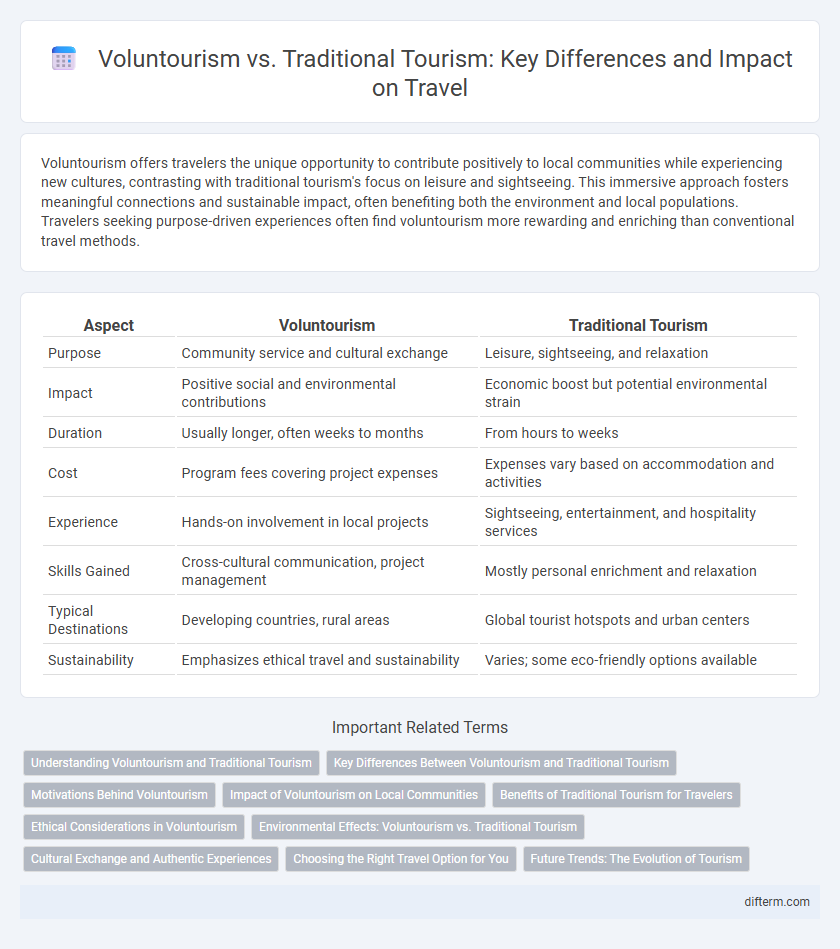Voluntourism offers travelers the unique opportunity to contribute positively to local communities while experiencing new cultures, contrasting with traditional tourism's focus on leisure and sightseeing. This immersive approach fosters meaningful connections and sustainable impact, often benefiting both the environment and local populations. Travelers seeking purpose-driven experiences often find voluntourism more rewarding and enriching than conventional travel methods.
Table of Comparison
| Aspect | Voluntourism | Traditional Tourism |
|---|---|---|
| Purpose | Community service and cultural exchange | Leisure, sightseeing, and relaxation |
| Impact | Positive social and environmental contributions | Economic boost but potential environmental strain |
| Duration | Usually longer, often weeks to months | From hours to weeks |
| Cost | Program fees covering project expenses | Expenses vary based on accommodation and activities |
| Experience | Hands-on involvement in local projects | Sightseeing, entertainment, and hospitality services |
| Skills Gained | Cross-cultural communication, project management | Mostly personal enrichment and relaxation |
| Typical Destinations | Developing countries, rural areas | Global tourist hotspots and urban centers |
| Sustainability | Emphasizes ethical travel and sustainability | Varies; some eco-friendly options available |
Understanding Voluntourism and Traditional Tourism
Voluntourism combines travel with volunteer work, allowing travelers to contribute to local communities while gaining cultural insights. Traditional tourism primarily focuses on leisure, exploration, and experiencing destinations without active community involvement. Understanding these differences helps travelers choose experiences based on their interests in cultural impact and personal growth.
Key Differences Between Voluntourism and Traditional Tourism
Voluntourism combines travel with purposeful volunteer work, allowing tourists to engage deeply with local communities through service projects, whereas traditional tourism primarily focuses on sightseeing and leisure activities. This form of travel often results in a more immersive cultural exchange and contributes directly to social or environmental causes, contrasting with traditional tourism's emphasis on entertainment and relaxation. Voluntourism can foster sustainable development and personal growth, while traditional tourism largely supports economic growth through hospitality and recreational services.
Motivations Behind Voluntourism
Motivations behind voluntourism often include the desire to make a positive social or environmental impact, personal growth through cultural immersion, and meaningful connections with local communities. Unlike traditional tourism, which typically prioritizes leisure and sightseeing, voluntourism attracts travelers seeking purpose-driven experiences that combine travel with service. This trend reflects a growing demand for ethical travel options that contribute to sustainable development goals and responsible tourism practices.
Impact of Voluntourism on Local Communities
Voluntourism significantly impacts local communities by promoting sustainable development through skill-sharing and infrastructure improvements that traditional tourism often overlooks. It fosters deeper cultural exchange and empowerment, helping address social issues like education, healthcare, and environmental conservation. However, the success of voluntourism depends on ethical practices and long-term engagement to avoid dependency or cultural disruption.
Benefits of Traditional Tourism for Travelers
Traditional tourism offers travelers well-structured itineraries that maximize cultural immersion and local experiences through guided tours and established landmarks. It provides access to reliable infrastructure, ensuring safety, convenience, and comfort during the trip, which is essential for stress-free travel. Furthermore, traditional tourism supports local economies by generating revenue for businesses, hotels, and restaurants, creating a sustainable impact on the destination.
Ethical Considerations in Voluntourism
Voluntourism raises ethical considerations centered on the true impact of volunteer work and its effects on local communities, often risking dependency or cultural insensitivity. Unlike traditional tourism, voluntourism must prioritize sustainable projects aligned with community needs and avoid exploitative practices that commodify local poverty. Ensuring transparent collaboration with locals and long-term benefits remains critical for ethical voluntourism development.
Environmental Effects: Voluntourism vs. Traditional Tourism
Voluntourism often promotes sustainable practices by involving travelers in conservation projects that directly benefit local ecosystems, reducing pollution and habitat destruction commonly associated with traditional tourism. Traditional tourism frequently leads to environmental degradation through increased carbon emissions, waste generation, and overuse of natural resources in popular destinations. Studies show voluntourism initiatives contribute to reforestation, wildlife protection, and community clean-up programs, mitigating negative ecological footprints more effectively than conventional travel methods.
Cultural Exchange and Authentic Experiences
Voluntourism fosters deeper cultural exchange by engaging travelers in local community projects, creating authentic experiences that traditional tourism often misses. Traditional tourism tends to focus on sightseeing and comfort, offering limited interaction with local customs and daily life. Immersive voluntourism allows travelers to contribute meaningfully while gaining genuine insights into the host culture's values and challenges.
Choosing the Right Travel Option for You
Voluntourism offers immersive cultural experiences and meaningful community impact, appealing to travelers seeking purpose-driven trips combining volunteering and exploration. Traditional tourism prioritizes leisure and sightseeing, providing structured itineraries and comfort tailored for relaxation and entertainment. Evaluating personal goals, preferred activities, and desired engagement levels helps determine the best travel option aligning with your values and travel style.
Future Trends: The Evolution of Tourism
Voluntourism is reshaping the future of tourism by blending meaningful community engagement with travel experiences, promoting sustainable development and cultural exchange. Traditional tourism continues to adapt by integrating technology, eco-friendly practices, and personalized itineraries to meet evolving traveler expectations. The convergence of these trends signals a shift towards more responsible, impactful, and immersive travel experiences in the coming decade.
voluntourism vs traditional tourism Infographic

 difterm.com
difterm.com